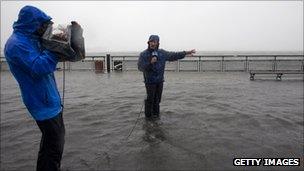A perfect storm
- Published
- comments

Rain-soaked reporters were a recurring part of the torrential media coverage
We have, with no regrets, waved goodbye to Irene. Very sadly, lives were lost. Little matters more than that. But the feared devastation did not happen. Neither buildings nor reputations were toppled.
Here on the outskirts of Washington DC it is now a perfect day, with blue skies and cooling winds. But last night we hunkered down, head torches and bottled water at the ready, favourite films transferred to the laptop to watch when the power went out.
Inevitably it did, and it's not back 16 hours later. We're in the same boat as around four million others. But around here it goes out when two birds chirp at the same time so it is an irritation of everyday life rather than an extraordinary imposition.
Irene was a perfect storm. Not in any technical sense. But the media love an extreme weather story. And we know the audience does too.
If you are in the path of the monster this is news that affects you very directly.
A couple of colleagues and I, holed up at Guantanamo Bay (more on that story later in the week) were divided between sniffy professional boredom at the cable networks hackneyed coverage of people preparing for what might happen, and our own obsessive desire to watch the coverage for any clue about what actually might happen, and whether we would make it off Cuba, via Florida, and so home for the weekend.
No politician could miss the warnings contained in the torrential media coverage. But they would get the point even without the deluge of shots of people hammering up their windows or packing their cars, or rain-soaked reporters.
For the word "Katrina" is branded on their brains. In his autobiography,, external George W Bush admits the response to that hurricane was not just flawed, but unacceptable. He just doesn't believe the fault was his. No matter. The man-made response to an act of nature helped ruin a president's reputation.
So Obama broke off his holiday, made a series of addresses to the nation and toured the HQ of Fema, external as the storm hit, looking stern and in control, if not sounding particularly inspirational. Mayor Bloomberg, external and Governor Christie, external also made a point of stressing that they were firmly in charge and aware of the potential dangers.
Had Irene torn the heart out of the eastern seaboard, there would have been finger-pointing, but these three politicians made sure they were doing the right thing, and were seen to be doing it.
Their reputations may not be actually enhanced, but they have avoided storm damage.